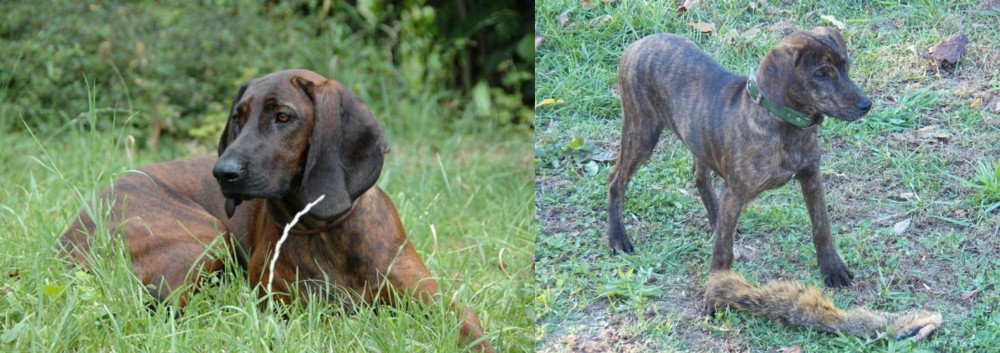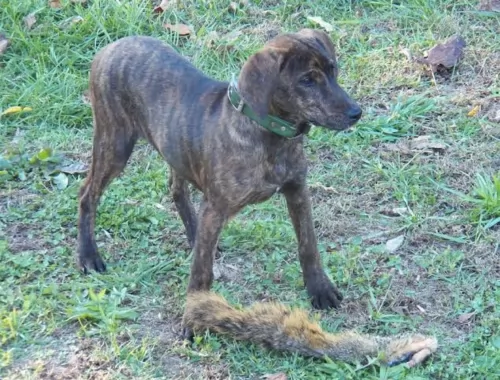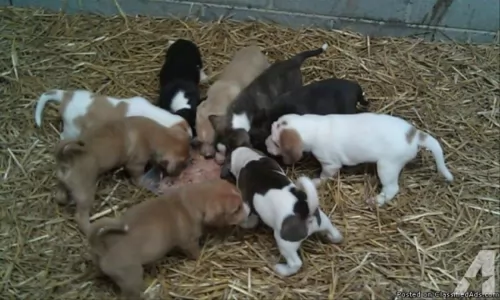 Petzlover
Petzlover Hanover Hound is originated from Germany but Treeing Cur is originated from United States. Hanover Hound may grow 6 cm / 2 inches shorter than Treeing Cur. Hanover Hound may weigh 26 kg / 58 pounds more than Treeing Cur. Both Hanover Hound and Treeing Cur has almost same life span. Both Hanover Hound and Treeing Cur has same litter size. Both Hanover Hound and Treeing Cur requires Low Maintenance.
Hanover Hound is originated from Germany but Treeing Cur is originated from United States. Hanover Hound may grow 6 cm / 2 inches shorter than Treeing Cur. Hanover Hound may weigh 26 kg / 58 pounds more than Treeing Cur. Both Hanover Hound and Treeing Cur has almost same life span. Both Hanover Hound and Treeing Cur has same litter size. Both Hanover Hound and Treeing Cur requires Low Maintenance.
 Sometimes referred to as a Hanoverian Hound, this dog dates way back to the 17th century in Germany.
Sometimes referred to as a Hanoverian Hound, this dog dates way back to the 17th century in Germany.
This dog breed continues to be fairly rare today and has always been used as a hunting and tracking dog. It is believed the dog comes from bloodhounds dating back to medieval times. The dog isn’t recognized by the AKC but he is a member of the Scenthound group.
 The Treeing Cur dog is a mixed-breed, working dog which hails from the USA and recognized by the United Kennel Club in November 1998.
The Treeing Cur dog is a mixed-breed, working dog which hails from the USA and recognized by the United Kennel Club in November 1998.
They’ve always been used to tree animals such as squirrels, raccoons, bears, and even mountain lions. They were developed to be used as hunting and guarding dogs.
Aside from these good qualities, today the dog makes an excellent family companion.
 This is a sturdy, well built dog with a short, smooth, dense coat which is a reddish-brown color with brindling.
This is a sturdy, well built dog with a short, smooth, dense coat which is a reddish-brown color with brindling.
He is a well built, deep chested dog standing at about 50 – 55cm in height and weighing 48-53cm. He has the typical dark brown, soulful eyes of the Hound dog with long, broad, floppy ears.They usually have black noses, he has a deep chest, strong, straight legs and long, tapering tail.
Calm and gentle, the Hanover Hound is a loyal dog who bonds closely with his human family. When you socialize him he gets along well with children.
He is a hunting dog and loves nothing more than to be following some scent. You can call out his name, but he will not likely take notice, so determined is he to track down his prey, being known for his superb sense of smell.
His hunting instincts are strong and this means that you won't often find him being kept essentially as just a pet – they are first hunting dogs and then pets. Nonetheless, as already suggested, the Hanover Hound is more than capable of forming a strong bond with his human family, making a good family pet.
He is aloof and wary with strangers and this makes him a good watchdog. It is important to have him trained and socialized as then he becomes obedient and amicable when you need him to be like that around friends and family.
 Standing at between 46 – 61cm in height and weighing between 14 – 27kg, the medium-sized Treeing Cur is athletic and muscular.
Standing at between 46 – 61cm in height and weighing between 14 – 27kg, the medium-sized Treeing Cur is athletic and muscular.
He has a short to medium-length double coat that can be in a number of colors. Red and white, tan and white, black and white, brindle, some freckling and bi-colored or tri-colored.
The eyes are mostly brown but can be green or blue too. They’re well-muscled and robust and have medium length floppy ears. The tail is mostly docked but is sometimes left long.
These dogs are alert and intelligent, being easy to train and wanting to please their owners, getting along well with all members of the family, including children and other dogs.
They’re strong-willed dogs and will require training and socialization if you want them to be well behaved wherever they are. He is intelligent so there won’t be any trouble with training him. He is very responsive to what his owner requires of him, with a desire to make their owners pleased with them.
 The Hanover Hound is an intelligent dog breed that responds well to training and socialization. They are dedicated hunting dogs but they are loyal and loving to their human family.
The Hanover Hound is an intelligent dog breed that responds well to training and socialization. They are dedicated hunting dogs but they are loyal and loving to their human family.
He will require an owner who is active and on the go while being firm and consistent with his treatment of him.
When socialized, he makes a good friend of children too. Keep him busy, exercise him, provide him with good food and consistent love and attention and he'll make you a devoted hunting companion and friend.
 The Treeing Cur is a working dog that loves all the action. He is an alert, intelligent dog, and being territorial and protective, he makes an excellent guardian dog too.
The Treeing Cur is a working dog that loves all the action. He is an alert, intelligent dog, and being territorial and protective, he makes an excellent guardian dog too.
They can show some aggression towards strangers and other dogs they don’t know. Apart from being an excellent hunting dog, the Treeing Cur loves to be around their human family, making loyal and loving companions.
 Capable of living to between 10 and 14 years of age, the Hanover Hound, like many other dogs, may well be prone to some of the more common dog illnesses there are.
Capable of living to between 10 and 14 years of age, the Hanover Hound, like many other dogs, may well be prone to some of the more common dog illnesses there are.
Because of his long, floppy ears, he will typically be more prone to developing otitis externa. This is why it is important to be checking your long, floppy-eared dog regularly and cleaning his ears to avoid wax- and dirt build-up and infection. Chronic ear infections will have to be treated by your vet.
You'll recognize the illness when you see your pet shaking his head often and scratching at his ears.
This is a genetic orthopedic disorder that affects many dogs and will eventually cause lameness. Hip dysplasia is due to malformed hip joints.
Eye diseases and problems with the eyelid can cause your pet a lot of discomfort as this is when an eyelid rolls in and then rubs against the eye.
 These dogs are very healthy and you’re not likely to have many vet bills when you bring one into your home.
These dogs are very healthy and you’re not likely to have many vet bills when you bring one into your home.
The Treeing Cur has floppy ears, and particularly if it's a dog that loves swimming, it will battle with moisture in the ears. Dogs with floppy ears don’t have good air-flow inside the ears like a dog with erect ears would have. This means that the dog is prone to ear infections.
This is such a common dog illness that can strike even young dogs. That is why it is important to check your dog over regularly for lumps and bumps on the body. Age increases the risk of cancer, so if you feel an unusual lump on your Treeing Cur, better to have your dog checked out at the vet.
 The Hanover Hound is a hunting breed so he won’t easily adapt to life in the city with a tiny garden. He will need a large garden or a farm to run around in.
The Hanover Hound is a hunting breed so he won’t easily adapt to life in the city with a tiny garden. He will need a large garden or a farm to run around in.
He is a hunting dog that loves to put his nose to the ground and to follow a scent. This is a dog breed which will need to be provided with a good amount of exercise every day to ensure his happiness and health.
As a large dog breed, you want to be sure to be feeding him a high quality food. It is always a good idea to add in some home-made food to his kibble. Read the packaging carefully of commercial manufactured dog foods and make sure you get food that is geared towards large, active breed dogs.
Add in cooked food such as cooked chicken, vegetables or brown rice and pasta and remember to include some raw meat into his diet from time to time.
Before dogs were domesticated they would eat raw meat as opposed to harmful grain based commercial dog foods of today. Benefits of adding in some raw meat from time to time include healthier skin, more energy and shinier coats and eyes. Make sure your pet has a constant supply of fresh, cool water.
 Being an energetic working dog, this dog isn’t going to be content to be lying around. He is going to need regular exercise. He loves a brisk walk or even a run next to you when you go cycling.
Being an energetic working dog, this dog isn’t going to be content to be lying around. He is going to need regular exercise. He loves a brisk walk or even a run next to you when you go cycling.
When at home, you can consider ball games and hide and seek games with him. They just love to run, and if you live near a park, he will want to be off the leash if possible for some free running and sniffing around.
The short coat of the Treeing Cur will do well with a brush twice a week. While you brush your dog, check him out for ticks and fleas. Also, check him over for any unusual lumps.
Part of his grooming should be to check inside his ears for signs of redness, to make sure his eyes are nice and bright still and to see if he will let you look inside his mouth for bad teeth. Bad teeth can be a source of pain for him.
Caring for your Treeing Cur in a responsible manner means ensuring good food. Such an active dog will require proper nutrients so as to meet his energy and health needs.
Your Treeing Cur will need a high-quality commercially manufactured dog food for active dogs and they will also benefit from other simple cooked foods such as boiled chicken, brown rice and vegetables. The habit of feeding your Treeing Cur human foods such as chocolates, popcorn, peanuts, onions and spices could cause digestive upsets and possible vet fees.